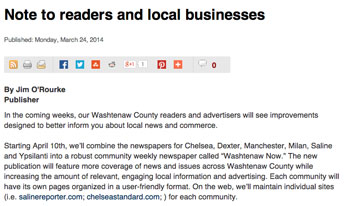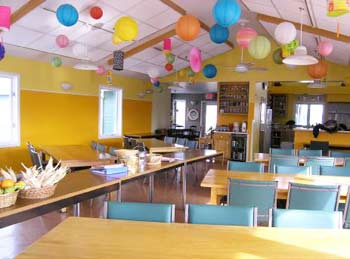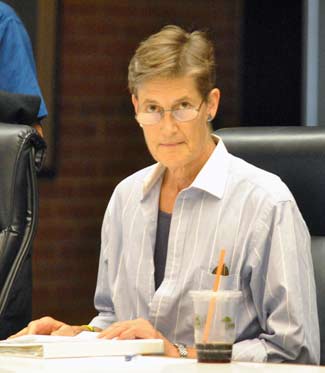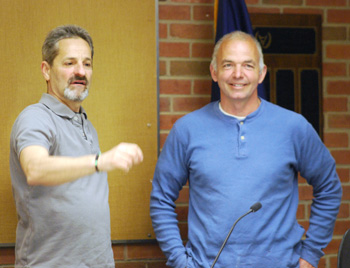Washtenaw County board of commissioners meeting (March 7, 2012): Although the county board isn’t yet in the heart of discussions for its next two-year budget cycle, the specter of that effort provided a backdrop to action at Wednesday’s meeting. The county faces projected deficits of $11.6 million in 2014 and $14.7 million in 2015.
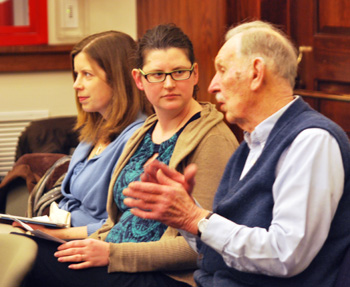
From left: Jenna Bacolor of the county's public health department, Michaelle Rehmann, Farm to Table director for the Food System Economic Partnership (FSEP), and Al Connor of the Michigan Farmers Union. All are involved in helping create the Washtenaw Food Policy Council. (Photos by the writer.)
Two items touched directly on salary and compensation. The board gave final approval to an administrative restructuring that’s estimated to save $326,422 annually, and result in the net reduction of four full-time jobs, which are currently vacant. As he did for the initial vote on Feb. 15, commissioner Ronnie Peterson voted against the restructuring, objecting to a 4% increase that will be given to four top managers in a new cross-lateral team, as a result of their job reclassification. Though the county uniformly gives a 4% raise when any job is reclassified, Peterson argued that the county’s leadership should set an example and that the raises will make it more difficult to ask for concessions in future union negotiations in 2014-15.
Also related to upcoming budgets, commissioner Dan Smith presented a draft proposal that would cut compensation for commissioners in 2013-2014. Overall, the proposal would cut total compensation (salary and benefits) by 5.7% per commissioner – from the current $20,213 to a proposed $19,063. He plans to present a formal resolution at the April 4 meeting. The timing would allow the board to make a decision before the May 15 filing deadline for county board candidates.
Another budget-related item came from the public health department, which proposed fee increases to treat sexually transmitted diseases – one of the mandated services provided by the county. The changes, which were approved unanimously, are being made in response to federal funding cuts and an increase in charges for state services. Though he voted in favor of the increases, Peterson raised concerns about the impact on low-income residents. Dick Fleece, director of the public health department, assured the board that no one would be refused treatment because of the inability to pay.
Public health staff also presented an item with almost no budget impact: A proposal to create the Washtenaw Food Policy Council, with the goal of supporting and coordinating activities in the county’s food system. Partners who’ve been working on this initiative include the Y of Ann Arbor, Growing Hope, Food Gatherers, the Food System Economic Partnership (FSEP), Slow Food Huron Valley, Eat Local/Eat Natural, Michigan Farmers Union, and the Ypsilanti Food Coop. A final vote is expected on March 21.
The board also acted on items related to public safety. They voted to accept a $177,500 state grant from the state’s Economic Vitality Incentive program (EVIP), which provides incentives for local governments to collaborate and combine operations. The grant will help pay for work related to dispatch consolidation between the county sheriff’s office and the city of Ann Arbor.
And in a vote to clear up a procedural move, the board authorized a merger of its countywide 800 megahertz (MHz) emergency communications system with the Michigan Public Safety Communication System. The county’s 800 MHz system is paid for through a 10-year, 0.20-mill tax that Washtenaw County voters approved in May 2006. At the time, the plan called for eventually merging with the statewide system.
During the opportunity for commissioners to raise items of discussion, Wes Prater noted that at the Ann Arbor city council’s March 5 meeting, a four-party agreement to establish a framework for a possible countywide transit system was approved. Prater urged the board to begin discussing the issue, too. [In addition to Ann Arbor, the four parties include the city of Ypsilanti, Washtenaw County and the Ann Arbor Transportation Authority. Ann Arbor city council was the first entity to approve the accord, doing so after postponing action on it three times and deliberating for over 3.5 hours at Monday's meeting. See Chronicle coverage: "Ann Arbor Council OKs Transit Agreement"]
A working session for commissioners to address the four-party agreement has been set for Thursday, March 22.
Prater also wondered why the board hadn’t received any reports from the county treasurer recently. The treasurer, Catherine McClary, gave a 2010 annual treasurer’s report to commissioners early last year, at their Feb. 16, 2011 meeting, but has not yet submitted the 2011 annual report. Board chair Conan Smith asked county administrator Verna McDaniel to contact the treasurer’s office and request a report. [Full Story]




